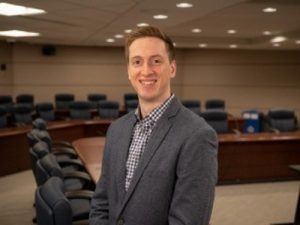Q &A with Daniel Verburg, MPAcc Alum
Daniel Verburg graduated from Foster School’s MPAcc in 2018 and is currently a Postgraduate Technical Assistant (PTA) at the FASB (the Financial Accounting Standards Board) in Norwalk, Connecticut. The FASB is the organization that establishes financial accounting and reporting standards for public and private companies and not-for-profit organizations that follow Generally Accepted Accounting Principles (GAAP).
Technical Assistant positions at the FASB are available to individuals completing a postgraduate degree in accounting or taxation and are highly competitive, with graduate students applying from all over the country. Given the high honor of being chosen as a PTA at the FASB, we reached out to Daniel to ask him to reflect on Foster’s MPAcc program.

Daniel Verburg, 2018 MPAcc Alum
Why did you choose UW’s MPAcc program?
I chose the MPAcc program to expand my understanding of current accounting and auditing practices in a program that is well-respected in the Seattle business community. I was fortunate to find that not only was I educated on current practice, but the program also focused on technological innovations that are changing the accounting industry. This balance between current practice and emerging trends in the industry made me happy I chose the MPAcc program.
How has MPAcc prepared you for your current role?
The MPAcc program focuses on some of the most complicated areas of accounting from the perspective of financial statement preparers and auditors. Learning to understand complicated areas of accounting is a skill I developed in the MPAcc program and have put to use at the FASB. In addition, the FASB staff is expected to consider the effects of changes to accounting standards on different stakeholder groups (e.g., preparers, investors, auditors, etc.). The MPAcc program helped me understand the perspective of preparers and auditors.
What advice would you give a current undergraduate choosing between MPAcc or a 5th year of undergraduate classes?
I would advise students completing their bachelor’s degree to approach their fifth year with a long-term perspective. There may be value in a double major, but I have found that a master’s degree is an effective way to communicate subject matter expertise. For me personally, my position with the FASB was only open to students pursuing a master’s degree in accounting.
What were the advantages of getting a masters in Seattle?
Earning a master’s degree in Seattle gives students access to some of the largest companies in the world. The MPAcc curriculum allows students the opportunity to focus their studies on some of those companies, and even allowed students to interact with management as part of our final project. The MPAcc program takes advantage of its fortunate location.
Is there anything else you would tell a prospective student about UW’s (Foster’s) MPAcc program?
It seems that in today’s accounting industry it is insufficient to understand accounting and auditing rules. Accountants are expected to problem solve in uncertain situations and have an understanding of how analytics and technology affect their role. The MPAcc program is designed to equip students with both of these skills.
